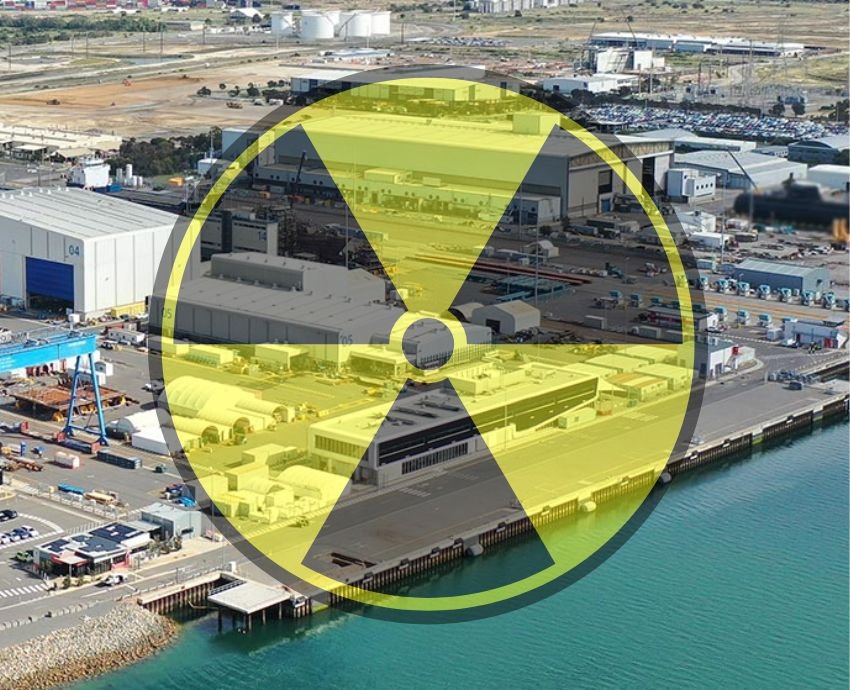
Labor introduced a bill on November 16, which cites Osborne, South Australia, as the first designated zone for the AUKUS nuclear-powered submarines.
The Australian Naval Nuclear Power Safety (Transitional Provisions) Bill 2023 allows for naval nuclear reactors at Port Adelaide under a new “Australian Naval Nuclear Power Safety Regulator”. That entity is to report directly to Minister for Defence Richard Marles.
Nuclear submarines have never used this port.
Alarmingly, Section 132 of the bill overrides the Australian Radiation Protection and Nuclear Safety Act 1998 and the military regulator is given powers over the civilian Australian Radiation Protection and Nuclear Safety Agency (ARPANSA).
The Medical Association for Prevention of War has sounded the alarm. “Naval nuclear reactors — like all nuclear reactors — pose potentially serious risks for people and the environment. But unlike other reactors, most information about naval reactors is kept classified, and it can be difficult to say how safe they are.”
Marles told parliament he will hold the power to direct the military nuclear regulator during a “national security” emergency.
Stirling Naval Base, near Fremantle in Western Australia, is also declared a second nuclear zone in this bill.
SA and WA communities have the right to have a say on nuclear safety and the risks in bringing naval nuclear reactors into the ports.
Key public interest questions are yet to be answered.
They include: Will communities be consulted on accident response plans? What is the existing radiation emergency capability in current and proposed nuclear sub port sites? Will local health and medical services be consulted? How will communities be properly informed about the risks of naval nuclear reactors? How will safety issues be monitored and communicated? How will the public interest in safety issues be protected? When will accident scenarios for nuclear subs at base be modelled and made public? How can the public verify the quality of emergency management plans and systems? How can authorities demonstrate their capacity to respond to radiation emergencies, and other accident scenarios?
The bill has gone to a Senate Foreign Affairs, Defence and Trade Legislation Committee inquiry, which is open for public submissions and is due to report in April.
The bill proposes to override state laws. Section 135, “Operation of State and Territory laws”, states: “If a law of a State or Territory, or one or more provisions of such a law, is prescribed by the regulations, that law or provision does not apply in relation to a regulated activity.”
The bill provides for regulated activities in “nuclear waste management, storage and disposal” at AUKUS facilities in future nuclear zones, to be authorised under Section 135.
According to media reports in August, the Woomera rocket range is understood to be the “favoured location” for the storage and disposal of submarine nuclear waste.
If the federal government wants to locate an AUKUS nuclear waste dump in SA, it will have to override existing law.
This AUKUS bill is a threat to the people of SA and WA. AUKUS locks Australia into buying existing United States military nuclear reactors in second-hand decade-old submarines, loaded with intractable US-origin weapons grade high-level nuclear wastes.
US Vice Admiral Bill Houston has said in-service Virginia class submarines would be sold in 2032 and 2035 and a newly-produced submarine in 2038.
AUKUS’ claims of “nuclear stewardship” with US nuclear submarines and retaining the US origin high-level nuclear wastes are a farce. The US has been unable to dispose of its own high-level wastes.
Marles said in March there would be an AUKUS announcement by early 2024 on a process to manage high-level nuclear waste and to site a waste disposal facility.
The storage and disposal of nuclear wastes compromises the safety and welfare of the people of SA. That is why it is prohibited by the state’s Nuclear Waste Storage (Prohibition) Act 2000.
This law covers public interest issues, including health, safety and welfare as well as “to protect the environment in which they live by prohibiting the establishment of certain nuclear waste storage facilities in this State”.
The import, transport, storage and disposal of high-level nuclear reactor waste is prohibited in SA.
This AUKUS bill must be challenged. SA Premier Peter Malinauskas is yet to say if he will support an Indigenous right to say “No” to an AUKUS dump. South Australians have a right to decide their own future and to say “No”.
[David Noonan is a long-term anti-nuclear campaigner. For more information see the Medical Association for Prevention of War’s Safety Brief. Contact the Committee Secretariat on 02 6277 3535 or email fadt.sen@aph.gov.au. Upload your submission here.]